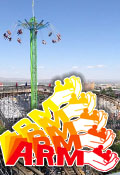Park sees drastic reduction in waste with innovative approach
AT: Tim Baldwin
ARLINGTON, Texas — When it comes to innovative ideas, dealing with trash isn’t the first subject to come to mind. However, Six Flags Over Texas is finding major success with a new system.
Operations Manager Matt Hughey became aware of a dramatic approach using bacteria being offered by Advetec, an England-based company. Given the green light to investigate, Hughey traveled to the U.K. to see the system firsthand.
“When it was first explained to me, it almost sounded sci-fi, but with future conversations, it made more sense,” said Hughey. “Bacteria is on everything. It’s on our bodies, our walls, it’s on everything. There are all kinds of bacteria, and different types break down biological things better than others. Basically, the bacteria work at different temperatures.”
Advetec is a specialist in the on-site reduction of solid and liquid organic waste. In 2017, the company launched an evolution of its bio-thermic digester technology. The Advetec XO system is designed to rapidly reduce the organic content within waste at the source, cutting off-site transportation and processing costs and helping companies achieve zero waste to landfill.
So how does it work?
“When you throw a trash bag away, it may be pretty full, but there is probably a lot of air in there,” Hughey told Amusement Today. “In order for bacteria to be as useful as it can be, it needs to get in and around as much trash as possible. So, the trash goes through an industrial grade shredder to begin the process. By breaking up that trash, you’ve already reduced what would be going to a landfill anyway. It’s more compact.”
Based upon the trash going into the machine past that point, heating elements “wake up the critters,” as Hughey jokingly calls it, and also dehydrates the material. About every six hours, the machine introduces a new culture of bacteria, not only to replace those that eventually die off, but a larger culture works more efficiently in breaking down the waste material. If any cleaning products were included in the trash that might kill good and bad bacteria, the introduction of new cultures keeps the process working.
“The machine has two chambers,” Hughey said. “What separates the two is a half wall at the bottom and then bars at the top. As the first chamber fills, turning arms inside of the chamber churn material both directions to help with dehydration and for the bacteria to start eating through it. It almost has an herbal smell, like a fruitcake.”
Six Flags has seen the combination of the grinding away of the matter and bacteria eating it up results in a 90 percent breakdown on average.
“If you put ten trash bags in, one trash bag [of waste] comes out,” Hughey said, simplifying the process. “It’s pretty darn consistent. There’s nothing special about the bacteria. They’ve found certain types work better on paper products, certain bacteria work better with plastic and foods and so on and so forth. The mixture of variety of bacteria in there work best in certain temperatures. The secret is not the bacteria itself, but a special solution that I call ‘Red Bull’ for bacteria. It causes the bacteria to breathe faster, and in so doing causes them to want to eat more.”
The machine does the bulk of the work and registers more trash coming in and reacts accordingly. When the trash leaves the system, it is somewhat sterilized from the process. Any residual bacteria that remain pose no risk as it is natural bacteria that exists in the environment at all times.
Part of the service agreement finds Advetec coming out every 90 days to supply new cultures of bacteria and plenty of stimulants. Six Flags is not required to order anything in advance.
When the process is complete, the sheer reduction of waste is the major win. But it doesn’t necessarily stop there. Certain companies will be analyzing the resulting material from the park. If it proves suitable, then Six Flags can sell the material to the companies to be burned to produce energy. If this turns out to be the case, then it is a double win.
“Even if it isn’t suitable, it is still way better to go to the landfill like that,” Hughey said. “It’s way better, period.”
On an on-site visit, AT witnessed the process firsthand and found the process dramatically impressive. Of note are the safety procedures that make the home run a grand slam.
Only trained people can operate the machine. Several E-stops around the operation are in place, in case a worker hears something problematic, such as an unexpected large amount of metal cans. Those items can be removed. For the system to work, it requires an RFD tag by a trained operator. For trash to be placed into the machine, a foot pedal is used for bags to be transferred up a conveyor belt, which creates an additional safety measure keeping all hands and body parts away from the machine when things are in motion. There are also E-stop wires all around the conveyor for any issues that arise when inserting bags into the shredder. A timer will also turn off the shredder once it detects no movement on the belt after a programmed period of time.
“The XO unit has a monitoring system built into it,” said Hughey. “I can see what is going on with the unit, and [Advetec] is monitoring 24/7 as well. They might determine if it needs to be turned off before I do. They can turn it off via Wi-Fi. They can also make adjustments to speed up the process if they are seeing more trash than expected. There is a lot of options they can do.”
When not being “fed,” such as during the current COVID-19 crisis, Hughey reports the bacteria go into hibernation. When the park is not in daily operation, it doesn’t pose any issues.
This article appears in the JUNE 2020 issue of Amusement Today.
View the entire issue for FREE with our digital edition!


















